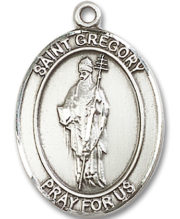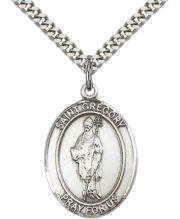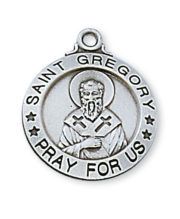Saints
St. Gregory the Great
St. Gregory The Great Biography
 St. Gregory the Great, also known as Gregory I, was a 6th century Pope, theologian, and Doctor of the Church. He was born in Rome around the year 540, and from an early age, he was deeply religious and deeply committed to the service of the Church. He was highly educated and received a formal education in the liberal arts and law. He also received spiritual formation from Benedictine monk, St. Benedict of Nursia.
St. Gregory the Great, also known as Gregory I, was a 6th century Pope, theologian, and Doctor of the Church. He was born in Rome around the year 540, and from an early age, he was deeply religious and deeply committed to the service of the Church. He was highly educated and received a formal education in the liberal arts and law. He also received spiritual formation from Benedictine monk, St. Benedict of Nursia.
In 572, Gregory was appointed as prefect of the city of Rome by the Emperor, but he resigned from the post to devote himself to the service of the Church. He built six monasteries in Rome, and served as a deacon, and later as an papal ambassador to the imperial court in Constantinople.
In 590, Gregory was unexpectedly elected as Pope, after the death of Pope Pelagius II. As Pope, Gregory is remembered for many contributions to the Church, including his efforts to reform the Church’s administration and his efforts to convert the Anglo-Saxons to Christianity. He was also known for his sermons and writings, in which he expounded on the teachings of the Church.
Gregory is best known for his role in the development of the liturgy and his work on the collection and interpretation of the Church’s sacred texts. He is considered the father of the medieval Papacy and one of the four Latin Doctors of the Church, along with Ambrose, Augustine, and Jerome. His contributions to the liturgy include the development of the Gregorian Chant and his the reform of the liturgical books.
Gregory was known for his spiritual and administrative reforms, which contributed to the strengthening of the papacy and the unity of the Western Church. He established a stable government in Rome and organized the Church’s administration. He was also known for his charitable works, and built several hospitals, orphanages, and monasteries in Rome.
He sent a mission of monks led by Augustine of Canterbury, who became known as “”the Apostle to the English””, and were responsible for converting the Anglo-Saxons to Christianity. He also wrote several books and letters, many of which are considered important spiritual writings.
Gregory was canonized by popular acclaim and his feast day is celebrated on September 3rd. His cult was confirmed by Pope Leo XIII in the late 19th century, and he is venerated as a saint by the Catholic Church. He is considered one of the great popes in the history of the Church, and his contributions to the Church’s liturgy and theology continue to be studied and celebrated today.
His writings and commentaries on the Bible continue to be studied by scholars and theologians, and his influence can be seen in various aspects of the Church, such as liturgy, monasticism and pastoral care. He is the patron saint of educators, teachers, students, and musicians.
The Life of St. Gregory the Great
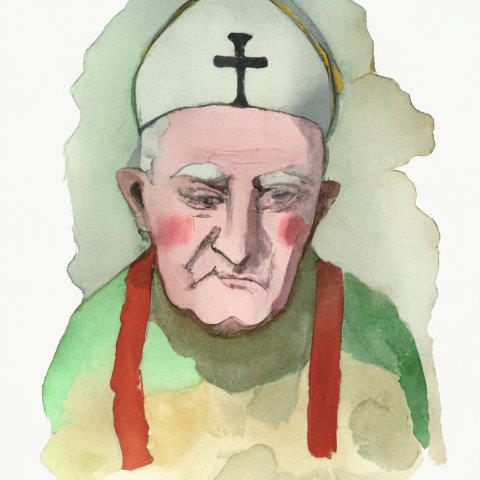 St. Gregory, one of the greatest Popes to fill the Chair of Peter, was a Roman of noble birth. By steady application of God-given powers he gained for himself the reputation of being one of the greatest scholars of his day. Upon the death of his father Gordianus, a wealthy patrician, Gregory distributed his inheritance among the poor and converted his families’ mansion into a monastery.
St. Gregory, one of the greatest Popes to fill the Chair of Peter, was a Roman of noble birth. By steady application of God-given powers he gained for himself the reputation of being one of the greatest scholars of his day. Upon the death of his father Gordianus, a wealthy patrician, Gregory distributed his inheritance among the poor and converted his families’ mansion into a monastery.
Service to the Church
For several years St. Gregory the Great lived as an ideal Monk; looked upon by all as a man of deepest spirituality. Pope Benedict I died in 579 and was succeeded by Pelagius II. This Pontiff compelled Gregory, by obedience, to take upon himself the sacred order of Deacon and the dignity of Cardinal, employing him as secretary. The period was one of acute crisis, as the Lombards were advancing towards Rome. The only chance of safety seemed to be in obtaining help from Emperor Tiberius at Constantinople.
In the spring of 579 Pope Pelagius dispatched a special embassy to Tiberius, and sent Gregory as his permanent ambassador to the Court of Constantinople; where he remained for seven years. In 586 Gregory was recalled to Rome. With great joy he returned to a humble life of ministry at St. Andrews Church, of which he became Abbot soon thereafter.
The Papal Election
At the death of Pope Pelagius in 590, Gregory, after vainly trying by flight to avoid the dignity, was elected Pope. The fourteen years of his Pontificate, despite ill health, were an outstanding model of ecclesiastical rule. He reformed Church discipline; healed schisms; saved Italy by converting the Arian Lombards, who were laying waste the country; aided in the conversion of the Spanish and French Arian Goths; was a champion and protector of the Jews, and sent St. Augustine with his forty monks as the first missionaries to the Anglo-Saxons, thereby earning for himself the title of Apostle of England. His Letters, Homilies, Biblical Explanations and Ascetical Works comprise multiple volumes.
The last years of St. Gregory’s life were filled with acutest sufferings, yet he would not allow his zeal for the Church to become dim. At last, on March 12, 604, came the long-desired and long-prayed for summons to Heaven. The Church venerates him as one of her four great Doctors of the West, and gave him the title of Gregory the Great. Wearing this St. Gregory the Great medal is a call of intercession for this great Pope to join us in our prayers.
Popular St. Gregory the Great Medal and St. Gregory the Great Rosary
Prayers to St. Gregory the Great
Prayer to St. Gregory the Great
Father,
you guide your people with kindness
and govern us with love.
By the prayers of Saint Gregory
give the spirit of wisdom
to those you have called to lead your Church.
May the growth of your people in holiness
be the eternal joy of your shepherds.
Through our Lord Jesus Christ, your Son,
who lives and reigns with you
in the unity of the Holy Spirit,
one God, for ever and ever.
Amen.
Prayer written by St. Gregory the Great
It is only right
with all the powers of our heart and mind,
to praise You Father
and your Only-begotten Son,
Our Lord Jesus Christ:
Dear Father, by Your wondrous
condescension of loving-kindness toward us,
Your servants, You gave up Your Son.
Dear Jesus, You paid the debt of Adam
for us to the Eternal Father by
Your blood poured
forth in loving-kindness.
You cleared away the darkness of sin
By Your magnificent and radiant Resurrection.
You broke the bonds of death
and rose from the grave as a Conqueror.
You reconciled heaven and earth.
Our life had no hope of eternal happiness
before You redeemed us.
Your Resurrection has washed away our sins,
restored our innocence and brought us joy.
How inestimable is the tenderness
of Your love!
Prayer to St. Gregory the Great
Dear St. Gregory,
You were known for your wisdom, your love for the Church, and your devotion to God. I ask for your intercession as I seek to grow in my own faith and to serve the Lord more effectively.
May your example inspire me to be a person of deep devotion, strong character, and unwavering faith.
Amen.
Prayer to St. Gregory the Great
St. Gregory,
You were a faithful servant of the Lord, dedicating your life to spreading the gospel and strengthening the Church. Help me to follow your example, and to always put the needs of others before my own.
May your love for God and your dedication to his work fill me with the courage and strength to do what is right, no matter the cost.
Amen.
Prayer to St. Gregory the Great
O St. Gregory,
You were known for your brilliant mind and your ability to communicate the truth of the gospel in a way that was accessible to all. Help me to have the wisdom to understand the truth and the courage to share it with others.
May your devotion to the Church and your love for the Lord be an inspiration to me, and may I always strive to follow your example in my own life.
Amen.
St. Gregory the Great: The Patron Saint of Teachers and Musicians
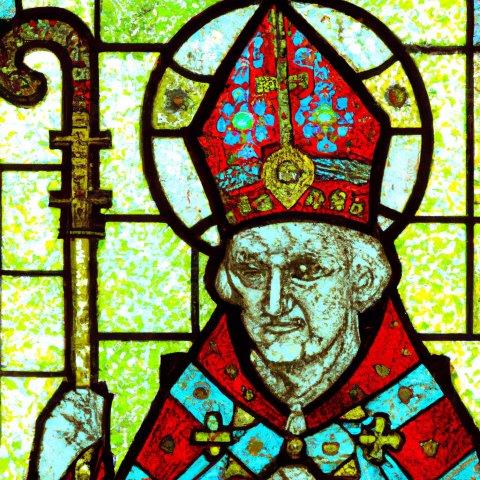 St. Gregory the Great is the patron saint of teachers and musicians. This recognition stems from his contributions to the fields of education and music during his lifetime.
St. Gregory the Great is the patron saint of teachers and musicians. This recognition stems from his contributions to the fields of education and music during his lifetime.
St. Gregory was a prominent figure in the early Christian Church, serving as Pope from 590 to 604. He was known for his theological writings, which helped to shape the beliefs of the Church during his time, and for his reforms to the liturgy, which included the introduction of Gregorian chant.
In recognition of his contributions to education and music, St. Gregory was canonized by the Catholic Church and is now venerated as the patron saint of teachers and musicians. This is because of his commitment to teaching and spreading the gospel, as well as his contributions to the development of musical expression in the Church.
Today, Catholics around the world continue to look to St. Gregory as an example of faith, scholarship, and musical talent. They seek his intercession on behalf of teachers and musicians, and they strive to embody his ideals of education, music, and devotion to God. Through their own efforts to share their knowledge and talents, they honor the legacy of St. Gregory and continue his mission of spreading the gospel and enriching the spiritual life of the Church.
Reflection on the feast day of St. Gregory the Great
The feast day of St. Gregory the Great is celebrated on September 3rd.
St. Gregory the Great was a Pope, a monk and a Doctor of the Church, who lived in the 6th century. He is known for his many contributions to the Church, including his writings on theology, liturgy, and pastoral care, as well as his role in the conversion of the Anglo-Saxons to Christianity. He is also credited with establishing the system of Church music known as Gregorian Chant. He is considered one of the four great Latin Fathers of the Church and is one of the two popes, who are Doctors of the Church.
On the feast day of St. Gregory the Great, we remember his deep faith, his wisdom, and his contributions to the Church. He serves as a powerful example of how one person can make a significant impact on the world through their devotion to God and their willingness to serve others.
One of the things that stands out about St. Gregory the Great is his pastoral care. He understood that the role of a bishop is not only to teach, but also to serve the people in his care. He spent time visiting the people of Rome, listening to their concerns and helping them to grow in their faith.
As we celebrate the feast day of St. Gregory the Great, let us take inspiration from his example of wisdom, deep faith and pastoral care. Let us be reminded that, as followers of Christ, we are called to serve others, to listen to their needs, and to help them to grow in their faith.
In addition, let us also remember St. Gregory the Great as the father of the Church music, and how his music is still being used today in the liturgy, and how it helps to elevate our souls to God. Let us use this day to reflect on how music can be used in our spiritual lives and how it can help us to connect with God.
Discover biographies, prayers, and reflections for more than 400 Catholic Saints
Next up: Biography of St. Hannibal
Also check out our handmade St. Gregory the Great Medal and St. Gregory the Great Rosary and St. Gregory the Great Rosary Bracelet.

